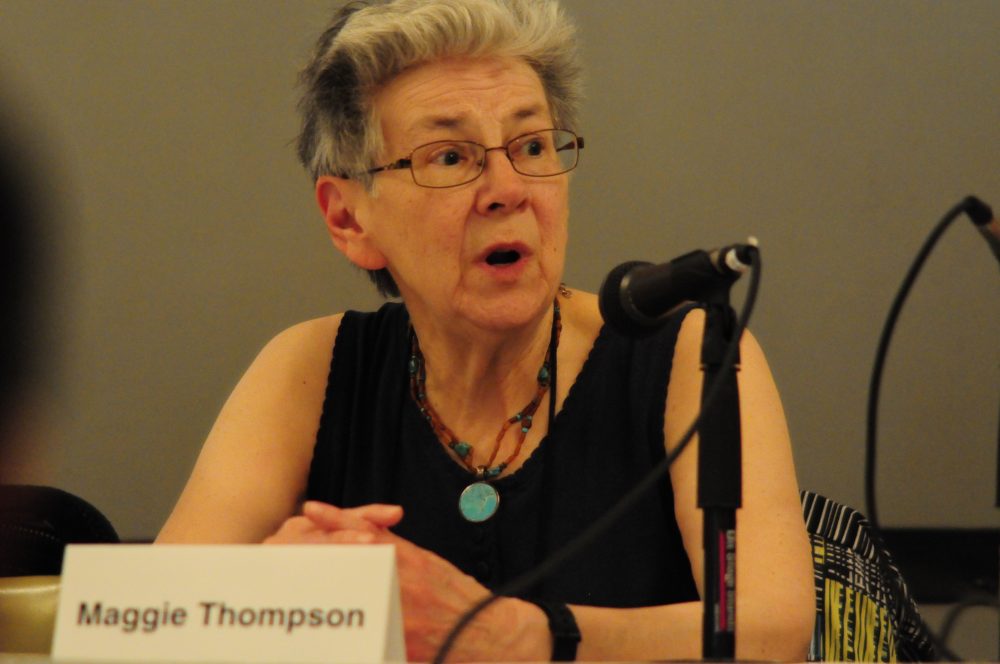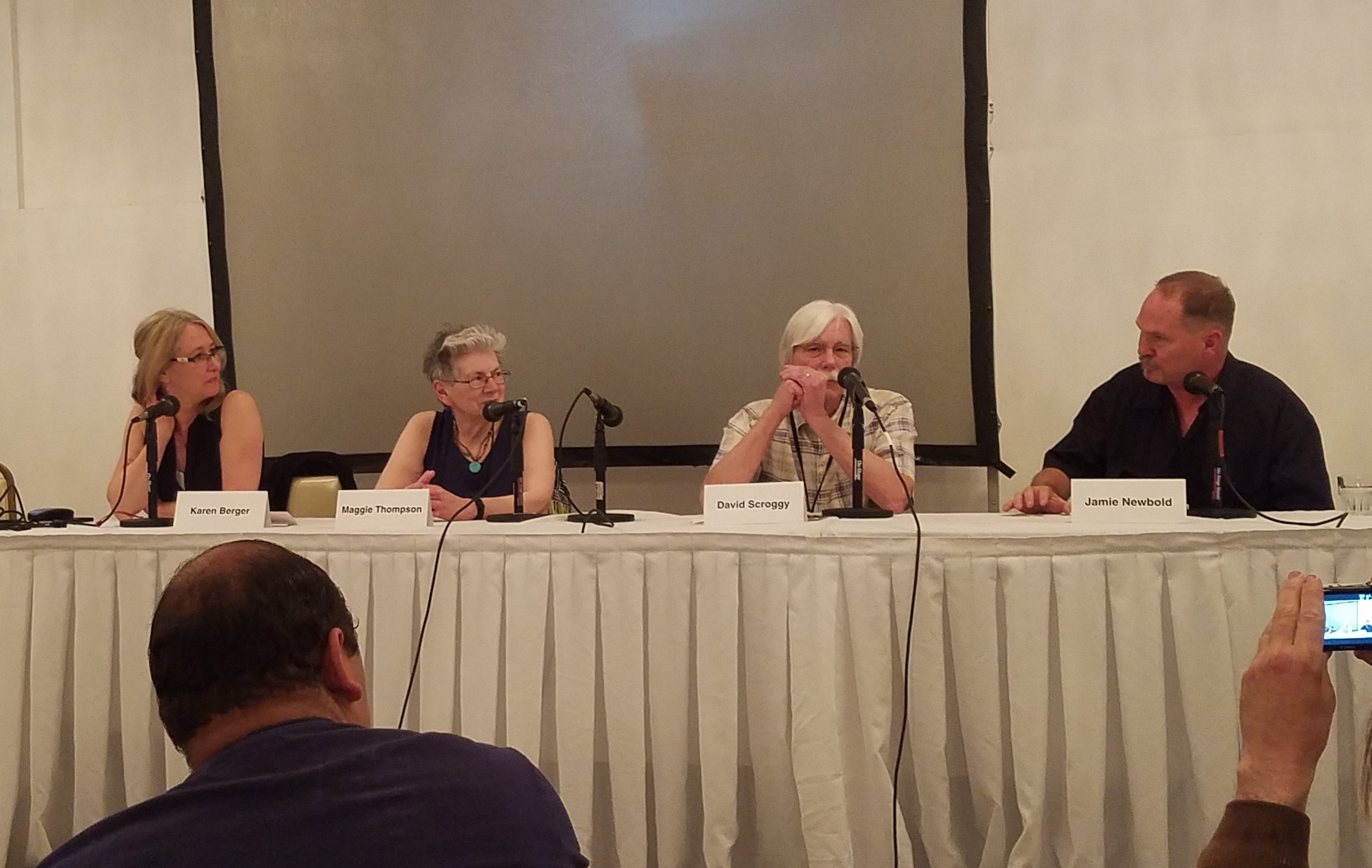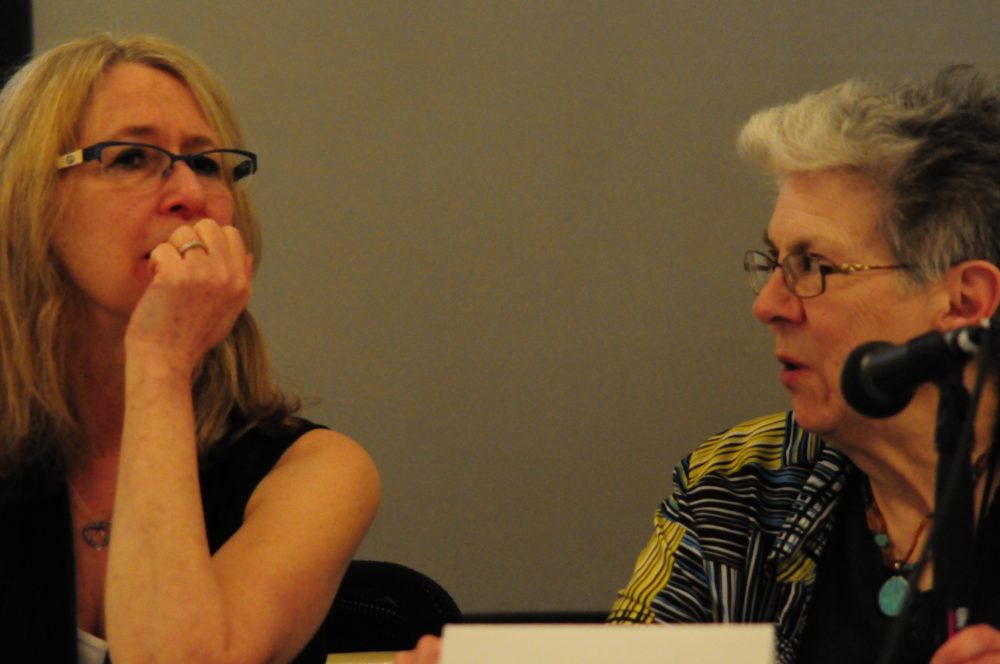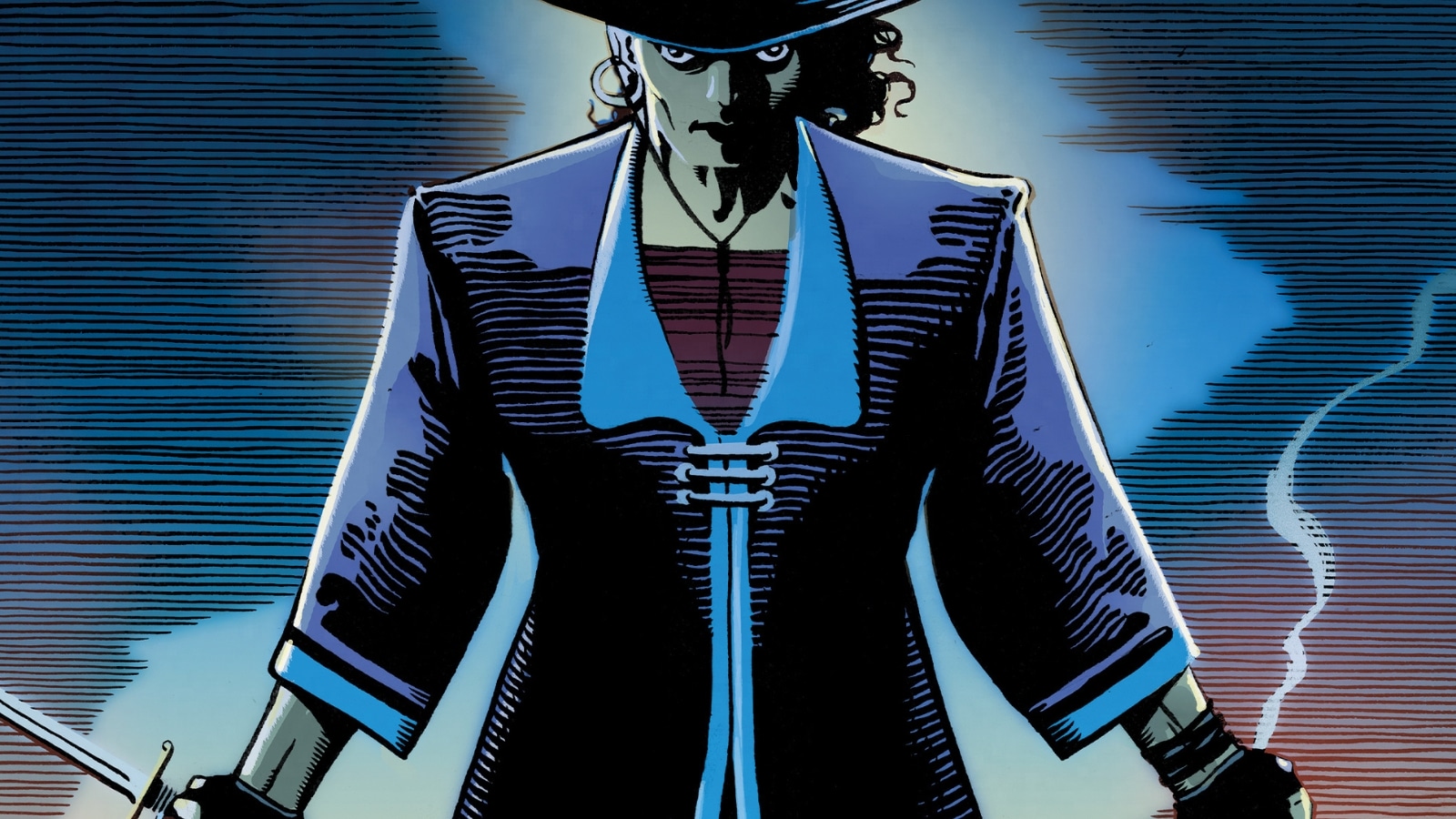
We are in a time where graphic novels are topping best-seller charts. Also, more than ever are people making comics. However, the comic book industry is still suffering. While the likes of the “big-two,” Marvel and DC, have found avenues of money through movies and other media, this still doesn’t address downward sales in printed media, which in turn is felt by readers and retailers.

At this year’s San Diego Comic Fest, several prominent people from the comic book industry were collected to discuss some of the issues with comics today. People such as: Maggie Thompson, former editor of the now defunct Comics Buyer’s Guide; David Scroggy, former Vice President of Product Development for Dark Horse Comics; Jamie Newbold, owner of local Southern California Comics and author of The Forensic Comicologist: How to Collect Comics the Smart Way; and Karen Berger, who helped to create DC’s Vertigo imprint and then held the position of its Executive Director for decades, until recently overseeing her own imprint, Berger Books, with Dark Horse Comics. The panel was moderated by Rob Salkowitz, author of Comic Con and the Business of Pop Culture: What the World’s Wildest Trade Show Can Tell Us About the Future of Entertainment and close follower of the comic book industry.

This panel was in no way meant to solve all of the comic book industries issues, but rather to continue a discussion that has been going for years now. Rob Salkowitz was first to talk, explaining how the issues of the comic book industry have been long ongoing and are nothing new. Jamie Newbold asked the room to shout out what they felt was wrong with comics right now. “If I hear something that I’ve never heard before, I’ll shout out “stop!’” Diamond Distributors, technology, online medias, online sales, and others were named by the audience. Not once did Newbold shout ‘stop,’ as he said afterward, “Not one thing you said is new.”
Maggie Thompson pointed out that publishers are having difficulty in getting readers excited in the stories that they are currently producing. She then asked Karen Berger “how she does it;” meaning, how she gets readers interested in the stories that she has overseen over the years. “Comic books have expanded beyond the superhero stories,” explained Berger. As she pointed out, across the likes of Europe and Japan comic genres are much more expanded compared to ours and have been for many years. For instance, many casual readers, and even some loyal comic fans, don’t know that the likes of France has an extensive comic book community that regards the medium almost as much as a find work of art. As Berger also pointed out, the market here is also moving beyond superheroes, slowly but surely, but in many ways publishers and retailers are not.

“The core of the comic shop model has always been super heroes, and that’s always been a mystery to me,” added David Scroggy. He continued, saying, “But in the more recent times we are seeing a lot of diversity of material, and we are starting to see a lot more personal works that are not superhero related.” He went further to say that retailers are being choked by amount of titles available nowadays and the distribution system. “The ‘signal to noise ratio’ is so high now, and if even you were a person who has, let’s say, gone to see some of the superhero movies and used to like comics, decide to walk into a comic shop to see what they are all kind of about these days because you like the movies, good luck!” Scroggy not only meant the amount of comics now available, but also the amount of “incomprehensible writing” and “complicated stories” that look intimidating to new or returning readers. “It’s really hard for a new person to kind of discover something.”

For retailers, they are consistently put to task with choosing what comics to buy and at what quantities. As a comic book business owner, Newbold explained that his choices are hampered by a number of factors. “I have to buy Marvel and DC,” he said, meaning they are safer bets in terms of what will move from shelves. Otherwise, Newbold has to take educated guesses on what other stories will sell. Sitting in the audience, local Executive Director of Little Fish Comic Book Studio, Alonso Nunez, pointed out that if comic stores would carry more graphic novels, then he knows those would sell well. “I often get asked by parents what their child should read or what is selling well right now. I tell them to buy Smile, or American Born Chinese, or others… but later, they tell me they went to comic shops and couldn’t find any of them there, so they end up buying them online… I think if more comic stores would carry graphic novels, more people wouldn’t have to resort to online.” It’s true that graphic novels have become driving forces in the comic book sales. In 2016, author and artist Raina Telgemeier’s work dominated the sales charts, making $14.4 million in sales reports CBR.com. To this, Newbold quickly explained that shipping costs often block him from ordering graphic novels. “They take up more space than a comic does… Because of it, they just kill me with shipping costs compared to comic books.”

Another contributor to the decline of physical comic sales has been the large shift to digital entertainment. The likes of Netflix, Hulu, YouTube, and Amazon have made entertainment available at anyone’s fingertips. Likewise, books have found new life in the form of eBooks, and so has comic books, with the likes of Comixology leading the way. Though, Newbold had this to say about the digital sales. “Comixology is apparently losing readership, and that is supposed to be the villains that were going to take me out, because now you have the revenue distribution through the internet from Marvel, to the guys who left me out of loop.” It is obvious that Newbold holds a great deal of contention for Marvel, who in recent news has come under accusations of making special deals with the likes of online retailer Amazon; deals that no brick and mortar store can possibly beat. “Five years ago, Marvel was in charge, and they ruled everything I did as a retailer. It was ‘Marvel first.’ Now, they are the bastard children of the industry. I’ve lost probably 25% of my comic readership because 25% of my Marvel fans got tired of my higher cover prices, the non-sequitur storylines, the almost incomprehensible X-Men this and that… Marvel has done nothing to drive the industry towards us.”
Obviously, there are many concerns that plague that comic book industry. If I were to try and list every one of them, I would have the makings of a journalistic thesis. Like any old Marvel or DC story, each concern or wrong-step has been falling into place as a continuous series of issues. And just like Marvel or DC, over the years those issues have grown to a size that is overwhelming for any one person to tackle in a reasonable amount of time. Through more discussions like this, I’m hopeful that the dialogue is kept alive, making it unavoidable to all comic book publishers.









A few nitpicks/observations:
“…author and artist Reyna Telgemeier’s work dominated…”
“Raina.” Not “Reyna”
“Another contributor to the decline of physical comic sales has been the large shift to digital entertainment…Likewise, books have found new life in the form of eBooks…”
The shift to digital & streaming entertainment has been evident with music and movies/TV. But books is nowhere near as strong an example. Physical book sales in actual book stores has been fairly strong recently. Sales of eBooks have declined year over year for years.
“To this, Newbold quickly explained that shipping costs often block him from ordering graphic novels. “They take up more space than a comic does… Because of it, they just kill me with shipping costs compared to comic books.”
I seem to recall Brian Hibbs writing in his observations about comics retailing that some book wholesalers or publishers would offer free freight with a certain minimum order. Getting to that minimum order threshhold might be a challenge, and any retailer setting up with a new supplier can pose challenges as well. But if it’s good enough for Mr. Hibbs, it’s probably good enough for another retailer to at least investigate. If freight chargers are a blocker to stock book-format comics, have comics retailers exhausted their options among other supply chain sources?
“The core of the comic shop model has always been super heroes, and that’s always been a mystery to me,” added David Scroggy.
Exactly how I feel. In a well-equipped shop in a large city, you could shop for years without ever buying a superhero book. I’ve done it. But in the small shops in small towns, about all you can buy is superhero floppies.
For me it’s still the cost. 3.99 to 4.99 is just too much.
The stories just aren’t that good. It’s not rocket science.
Just make good comics, and don’t flood the Market. Look at Thanos by Cates. He just wrote a story he thought they would never publish, and it exploded. Now it is being cancelled and Thanos is shoehorned into the Infinity Whatever, even while it is a given fact that no Big Cross-Over has brought Marvel any new readers the last couple of years. How many Countdowns until the actual story begins, 3,99 or more per issue?
In terms of shipping, Random House is free shipping over $100 wholesale; Baker & Taylor is $2.50 per shipment (not box — shipment!) over 20 pieces. Even with Diamond, we (10+ years ago) moved to “reship”, which adds a week to arrival time, but cut shipping costs by (IIRC, about a third)
That’s just some of the options.
-B
I’d like to see some of the barriers to entry removed for small retailers. What if a corner store wanted to carry a few titles, along with their gum, chips and soda? What if a funky coffee shop wanted to carry a few graphic novels along certain lines, such as inclusivity? What if…
Comments are closed.